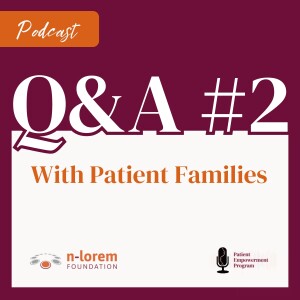
Wednesday Feb 07, 2024
Q&A #2 with Patient Families
Charissa Lipman joins n-Lorem founder and CEO, and host of the Patient Empowerment Program Podcast, Dr. Stan Crooke, in this question-and-answer episode to discuss additional questions asked during the 2023 Nano-rare Patient Colloquium. Charissa attended the inaugural Colloquium in October 2023 and brings the perspective of a patient family member, discussing her experiences and takeaways from the meeting. She is the mother of Ryker, a nano-rare n-Lorem patient with a CACNA1A genetic mutation. Stan and Charissa sit down to have a conversation and together address questions from the nano-rare community.
Do you have a question you want to ask Stan Crooke? Email podcast@nlorem.org for a chance to be featured in a future episode.
For general questions, email info@nlorem.org.
In this episode we answer:
08:25 As you are successful in discovering and developing individualized ASO for nano-rare patients, do you envision creating a library of ASOs that would be available to patients across the world?
10:29 For disease organization/patient advocacy groups that have several patients with the same mutation, should they apply for treatment as a group or separately?
13:16 Would an ASO developed for one patient work for another patient with a mutation in the same gene?
14:29 What's a SNP?
16:19 As a nano-rare family member, I have never been so inspired in an opening address as what was provided at the 2023 colloquium by Stan Crooke. Given the mission of n-Lorem, I don’t understand how any researching neurologist (or any researcher in the space) would not want to be at the absolute forefront of what n-Lorem is doing. Why do you think there is such an obstacle to being a part of an organization that has for the first time an opportunity to move the needle in such a meaningful way?
20:16 How would you describe the relationship between n-Lorem and the research physician, and what should patients expect from each side?
23:44 What do you mean by an optimized ASO?
24:59 Would you expect to see better results from ASO treatment in patients who are younger versus older?
28:10 The FDA has certain designations for program review (Fast Track, Orphan, etc,), is there anything like that for nano-rare patients?
29:35 I realize that there was significant work done in 2023 to streamline n-Lorem’s operations. Which processes in the workflow do you believe can still be optimized to help streamline patient programs?
31:35 Has there been a change in the amount of time it takes to process a patient and develop and ASO since the Foundation started?
32:50 Do you reach out to patients which presumably have ‘ASO-able’ genetic mutations?
34:12 Do you have any activities or ongoing projects that would help educate and train physicians who might be interested in participating with n-Lorem?
36:05 Are there any new updates regarding the 2024 Nano-rare Patient Colloquium?
41:36 Say a patient is denied from n-Lorem because at the time of their application submission, the Access to Treatment Committee declares that the program is not amendable to the current technology and/or ASO strategies, but new data/technology comes out that suggests that patient’s program has revived potential... will the ATTC automatically reassess the case or does a physician have to re-apply the patient to n-Lorem?